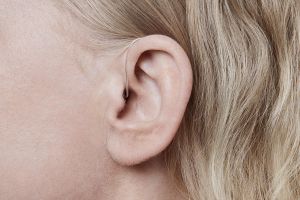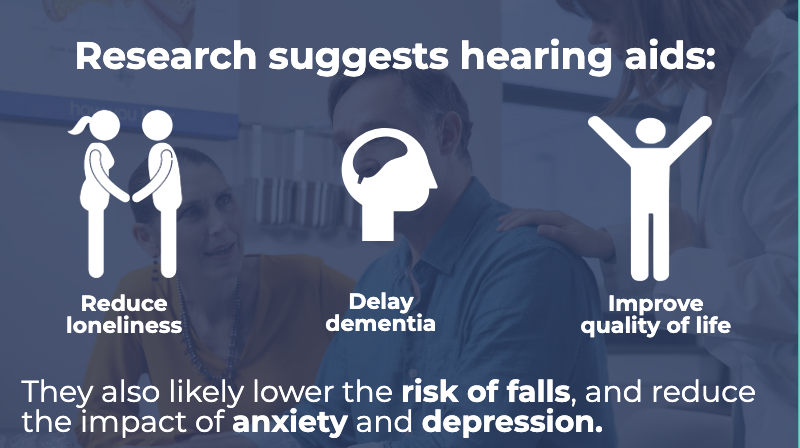Hearing loss is one of the most common health conditions facing Americans today. The right treatment depends on a number of factors, such as severity of hearing loss, the underlying cause, type of hearing loss and your lifestyle.

for people with hearing loss.
If you have trouble hearing, the first step is getting a hearing test and a thorough evaluation from a hearing care professional.
Table of Contents
Why treat hearing loss?
In children, untreated hearing loss negatively impacts language development, learning, and social engagement. Meanwhile, older adults with hearing loss often have difficulty following day-to-day conversations and may begin withdrawing from friends and family, activities and other things they enjoy.
In fact, for people entering their retirement years, untreated hearing loss has been linked to several physical and psychological issues, ranging from cognitive decline and depression to an increased risk of trips and falls.
The upshot? Hearing aids have health benefits beyond just helping you hear better.

The most common type of hearing loss is presbycusis, or age-related hearing loss. As we get older, the hair cells in our ears stop functioning as well as they used to and eventually stop working altogether. Nearly half of all people 75 or older have hearing loss.
Age-related hearing loss is a type of sensorineural hearing loss, meaning it originates in the inner ear and/or auditory nerve and is generally caused by damage to the inner ear hair cells. Along with aging, loud noise exposure is another big risk factor for this type of hearing loss.
Sensorineural hearing loss is permanent; hair cells can’t be repaired once they’re damaged. For people with type of hearing loss, hearing aids are the gold standard treatment. In some cases, cochlear implants or bone-anchored hearing aids may be recommended.
While it’s normal to gradually lose hearing as you get older, it’s not a good idea to leave it untreated. Your sense of hearing is a critical connection to the world, both for your safety and for your quality of life. If you’re experiencing a loss in hearing, seek treatment from a hearing healthcare provider who can help you pursue the best options for you.
Treatments for age-related hearing loss
Hearing aids and cochlear implants
If your hearing care professional recommends hearing aids, they will work with you to calibrate them to your specific hearing loss, during a process known as fitting. Hearing aids do not cure or restore hearing. The basic purpose of a hearing aid is to amplify sound. But today’s hearing aids can be highly customized to your specific hearing needs—amplifying the sounds you need to hear while minimizing those you don’t. While they can’t exactly mimic normal hearing, they work very well for people with mild to moderate hearing loss.
Hearing aids can be worn behind the ear or in the ear depending on the degree of hearing loss and personal preference. There are many types and styles. And yes, if you have hearing loss in both ears, two hearing aids are far better than one.
For some people, cochlear implants will be the recommend treatment. Implants require surgery, but they can be an excellent option for people who aren’t helped enough by hearing aids, including older adults.
Auditory training and rehab
Whether you are prescribed hearing aids or cochlear implants or another device, auditory training or rehab can help the brain relearn how to process noise into sound. Sometimes these exercises can be completed entirely at home, while others are more intensive, similar to visiting a physical or occupational therapist. But even listening to audiobooks or using smartphone apps to sharpen hearing can be helpful and reduce symptoms like listening fatigue.
Treatment for conductive hearing loss
The other main type of hearing loss is known as conductive hearing loss. It’s generally caused by a condition in the outer or middle inner and is usually temporary. Conductive hearing loss can be the result of earwax build-up in the ear canal, fluid in the middle ear or a perforated eardrum.
Conductive hearing loss treatment options usually involve medical intervention from an ear-nose-throat specialist to address the specific cause. In some cases, surgery might help. In the event medical treatment does not clear up the hearing loss, or the hearing loss is a combination of sensorinueral and conductive, a hearing healthcare professional will investigate other options, such as hearing aids, or surgical implantation of a bone-anchored hearing system or cochlear implant.
Note: Sudden hearing loss in one ear should always be treated quickly.
Assistive listening devices
Hearing aids are a big help, but sometimes they cannot address the very specific needs of every person. In these situations, there are countless accessories and assistive listening devices that can bridge communication gaps. Assistive listening devices (ALDs) can improve your experience while watching television, listening to music or talking on the phone. These include captioned phones, amplified phones, FM systems, TV hearing devices, smartphone apps, and hearing loops that connect with hearing aid telecoils.
What if I also have tinnitus?
It’s not unusual to experience tinnitus when you start to develop hearing loss as you get older. In fact, it can be one of the first signs of hearing loss. Fortunately, today’s hearing aids often come with what are known as “tinnitus masking features” to help tune out the ringing in your ears. A host of other tinnitus treatment tools are available to you, as well. It’s crucial to talk to your hearing care provider about your tinnitus.
If you’re a veteran
Hearing loss and tinnitus are two of the top health issues affecting both active military and veterans. In fact, the number one employer of audiologists in the U.S. is the Veterans Administration. If you served in the military, the VA provides hearing care for those who qualify.
How to get help
Hearing loss is all too common, but there has never been a better time to seek treatment with today’s amazing technology and medical options available. If you need help with your hearing, our directory of consumer-reviewed hearing clinics is a good next step.

